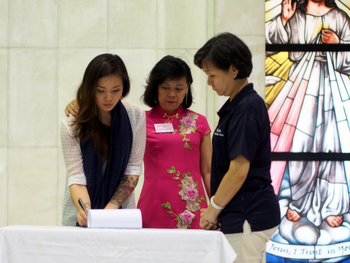 Many have interpreted the signing of the Book of the Elect to be a sign of commitment and discipleship. This is certainly true, and when seen in this light, it would seem appropriate for both catechumens (the unbaptized) and candidates (the already-baptized) to sign the Book of the Elect. However, the commitment and discipleship that is signified by the act of putting one’s name on the line goes deeper than just one’s own choice to serve God.
Many have interpreted the signing of the Book of the Elect to be a sign of commitment and discipleship. This is certainly true, and when seen in this light, it would seem appropriate for both catechumens (the unbaptized) and candidates (the already-baptized) to sign the Book of the Elect. However, the commitment and discipleship that is signified by the act of putting one’s name on the line goes deeper than just one’s own choice to serve God.
Roll call
For those of us who are baptized, we can recall that it is God who first chose us, and we responded by professing our faith and entering into the waters of baptism. In the same way, it is God who first called and chose the catechumens. Their signature, then, is not just a sign of their commitment to be faithful to the God who chose them; it is a sign that God has placed their names onto the roll of those who will put their lives on the line, first by dying in the waters of baptism, then by sacrificing themselves and living as resurrected people every day after. The inscribing of names then is less like a sign-up sheet and more like God taking roll call of those who will do God’s work in the world until Christ comes again.
When seen this way, it is only appropriate that catechumens alone sign the Book of the Elect, since we would hope that candidates are already doing God’s work because of their baptism when they had first put their lives on the line.
Who signs, and who doesn’t
Further, according to the Rite of Christian Initiation of Adults, in the combined rite for sending catechumens and candidates (530-546), it is clear that only catechumens sign the Book of the Elect even when candidates participate in this combined rite of sending. However, the catechumens’ godparents may also write their names into the book (123). Their signing is in no way similar to the signing by the catechumen, but is rather a commitment by the godparent to be responsible for his or her catechumen. This allowance for godparents to sign should not be transferred to candidates who exercise a completely different role in the church than godparents.
Lastly, many have the expectation that the bishop would “ratify” the catechumens’ signatures through his own signature in the Book of the Elect. This is not part of the Rite of Election nor had it been a practice of the early church. It has been a custom developed recently, especially after the mass-production of books of the elect by liturgical publishers who add a line for the bishop’s name onto each page of their books.
Ritually, on behalf of the church, the bishop announces his acceptance of the godparents’ testimony, receives the names of the catechumens, then, at the climax of the rite, declares the catechumens to be the elect of God, chosen for baptism. This declaration serves as “the bishop’s signature.” However, because the Book of the Elect can also serve as a record-keeping book for the parish, it would be appropriate to write the name of the presiding bishop into the book at a later time.


















I will be singing the book of Elect this weekend! I have never had such a great feeling! Please Pray for me, your brother in Jesus.
Congratulations Larry. Blessings!
Why does the Book of Elect (where the catechumen’s sign) say Candidate instead of Catechumen if only the Catechumens sign it? Seems like it should say Catechumen, not Candidate. Confusing?
Hi Brad. Yes, it is a little confusing. In the RCIA, there are two meanings for the word “candidate.” The first is the person who is the subject of a rite. So, the candidate for the Rite of Acceptance into the Order of Catechumens or the candidate for the Rite of Election. The second is the person who is already baptized and is seeking full communion with the Catholic Church or the completion of initiation. We call that person a baptized candidate (for reception or for completion of initiation). So, in the Book of Elect, the word candidate refers to the candidate for the Rite of Election.